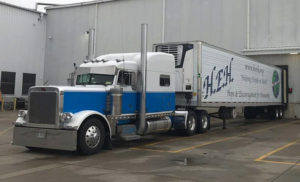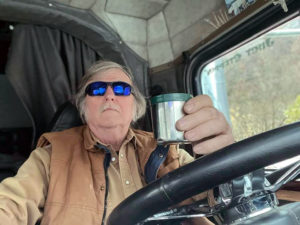Holy cow, it’s December again, and that means Christmas is near. Along with Christmas comes all the shopping for gifts and family and friends getting together to celebrate. But before that can happen there are cookies to bake, gifts to wrap, and toasts to be made. As a child I loved Christmas and all the pageantry that went with it. Since I was only one of many children in our house (not all of them were my siblings), our house was Grand Central Station on a dirt road.
It was a full-time job for my mom to keep us corralled and still breathing. The Mitchell house held fond memories for many, and for a host of reasons. Most of them were because Aunt Dot (that’s what everyone called my mother) and Uncle Chuck (my dad) never turned anyone away who was in need. The phrase “in need” covered a broad range of subjects. If you were hungry, there was always food on the table, even if it meant mom added an extra cup of water to the soup. If you were cold or wet from playing in the snow, mom had extra clothes to dry you out. They may not have been the latest in fashion, or even the correct size, but as kids of the 1960s, we didn’t think that far in advance.
In the eyes a child, our house closely resembled a Hobby Lobby store, since we children made most of the gifts we exchanged. Arts and crafts were a big part of the Holiday Season. I use the word “season” because it took weeks and sometimes longer to think up a gift, then plan it out, collect up the necessary stuff, and then make the gift. This all took time and waiting until the night before never worked out well. Keep in mind all of this was done in secret (kinda). I was pretty young, so I always needed help from the older kids or my parents. Sure, we received a few store-bought gifts from Santa, but they were few in number and real special. Mostly we got a new shirt or some new socks and underwear. Hold it, that’s what I got last year!
In those days, my dad was working a couple jobs, so nobody went hungry. All was good in the eyes of a child, and none of us ever considered our social status. There weren’t any rich folks around home, so none of us knew we weren’t rich. In fact, everyone we knew was like us, so I didn’t know anything different. Money didn’t mean anything to me as a child, and I never gave it any importance. Our house, as simple as it was, was full of hope, love, and promise. In the eyes of a child at Christmastime, every box held the promise of your wildest dreams. But one year, when I was maybe 7 years old, Christmas really did visit our house. Now before you get to thinking the old man has slipped his wig, let me explain.
I grew up on a family farm much the same as many of you. The times were difficult for my parents and the work was not always enough to cover the expenses. My father worked multiple jobs away from home in addition to the few acres he farmed during the summer months and the livestock we kept year around. In those days, most woman with children didn’t work away from home. My mom, like so many women of that time, had a full-time job just trying to keep things going smoothly around the house. She spent most of her time stretching the household budget to keep us kids clean, fed, and covered with clothes that didn’t look like we fell out of the rag bag.
As you can guess, when Christmas rolled around, we didn’t really expect our wish list to Santa to be granted. However, we were no different from kids all over the world – we wished for everything! Us kids spent many nights sitting on the cast iron register, wrapped in a blanket, looking through the massive Sears and Roebuck catalog or the fliers that came in the mail. That was the year I wished with all my heart to have a pearl snap western shirt like the one Roy Rogers wore. Who knew, even way back then, I wanted to dress like a truck driver! Somewhere in my mother’s collection of things there must be a bag of letters to Santa Claus, all written by children who believed in reindeer and flying sleighs. My mother would always tell us, “Dreams are cheap. It’s hope that fuels your ambitions.”
Someone once said the difference between a recession and a depression is simple: if your neighbor is out of work, it’s a recession, but when you are out of work, that’s a depression. Well, that’s where this story starts. During the 1950s and 60s, people flocked to Michigan to work in the car plants. The wages weren’t yet what they later became and there weren’t a lot of union shops with worker benefits. The people working line jobs (factory assembly work) were making fair wages, compared to retail shops or farming, so most men took an extra job working nights or second shift (late afternoons) and didn’t complain. However, along with that work in the automobile assembly plants, also came a relatively high possibility of injury.
I won’t use their real names – I will call them the Jones family. Mr. Jones was a big strapping man, and to a young kid like me, he looked like a mountain. Their family was much the same as mine and all of us kids seemed to be about the same age. Many of the families had moved up north to Michigan for work after the end of the war years. The automobile manufacturing business was booming, and they needed workers. Many of the single men (and married men without their families) would rent apartments in the city and crowd as many into it as possible to save money. Once the men were employed and financially stable, they moved their families there, as well. That usually meant renting an old farmhouse and starting over.
For those of you who don’t know what “starting over” is, it means living without life’s luxuries or other modern conveniences. That also meant chopping wood or shoveling coal to keep heat in the house. The younger children would wear the hand-me-down clothes from the older ones when they outgrew them. The same for shoes or boots. Unless you were the oldest child, you didn’t often see new clothes, and if you were the youngest, they had been altered so much most of them no longer resembled their original design. The internet had not been invented yet and color TV was definitely a luxury (if you had a TV at all). Ours was black and white, but mostly black, since it didn’t work about nine months of the year. Most of us kids spent our time riding ponies and fixing old junk bicycles. Living on the farm, with livestock, we spent hours every day doing chores and feeding animals. This was all part of our play time, and besides, if we went inside, we might have to do homework for school.
Every good Christmas story has to have a beautiful tree, with all the lights and tinsel streamers, and loaded with greeting cards from friends and relatives from far off places, right? Well, not exactly, but this one starts out that way. Sometime late in the Fall, Mr. Jones was working an extra shift at the car plant to make some Christmas money when a steel plate slipped and fell on one of his coworkers, pinning him to the floor. Knowing his friend and fellow worker was in serious trouble, he didn’t hesitate to step in and help. He managed to lift the plate enough for someone else to pull the coworker out from under the danger. Unfortunately, Mr. Jones blew out his back and was so injured that he was never able to work again. He was sent home and soon after laid off from his job.
Before the days of union labor, when you were “let go” it meant just that – let go, and not to be heard from again. There was no money for medical expenses, unemployment, or permanent disability – just a thank you and have a wonderful life. Fortunately, they lived in one of my uncle’s rental houses, so they weren’t put out on the street, while he was trying to recover. During this time, Christmas was drawing closer, and we were all preparing to celebrate the birth of Jesus Christ. In case you forgot, that is the reason for the season, not the big guy dressed in a red suit.
In those days, we never went to town for our tree, we cut one from a wood lot at one of our family farms. Us kids were spending every spare minute learning our parts for the Christmas play at church and helping mom and grandma make cookies for the holiday, and the final touches had to be put on the gifts we were making. We were living our lives not noticing the struggles happening to our neighbors. That was until the fire. It was just a few days before Christmas, and the Jones family had finally put up their tree and decorated the house. Things were starting to feel like they were getting back to normal for them. Then a cold spell hit, and the temperature dropped way below zero.
When this happened, most kids who had bedrooms upstairs in those old farmhouses grabbed their blankets and made themselves comfortable on the living room floor near a heater vent, because most two-story houses didn’t have heat in the upstairs rooms. There would be a big wood burning or coal fired furnace in the basement and most houses only had a single register (vent) in one of the rooms on the main floor. I remember it getting so cold in my room the frost on the inside of the windows would build up until it blocked my ability to see out. That’s when all of us would journey downstairs and make camp in the front room. We would beg my parents to leave the Christmas lights on at night so we could enjoy the tree, but dad always said, “No! And don’t let me catch you turning them on after I go to sleep,” fearing a fire might start.
No one is sure how the fire got started or why the tree went up so fast, but we were all thankful the Jones kids were sleeping together on the first floor that night. By the time the local fire department arrived, the house was gone, and only the foundation and fireplace were left standing. The Jones family was left with only the clothes they were wearing, and a few blankets wrapped around them – everything else went up in the fire. Some of the children were brought to our house that night and I can still remember seeing the red glow of their house as it burned. Later that morning, they all loaded up and went to the city to find housing.
I promised you a Christmas story, and I am here to tell you, this one gave a seven-year-old kid the true spirit of Christmas. My mother was not someone to sit on her hands and wait for someone else to do what needed to be done. As far back as I can remember, there was a familiar refrain of “charity begins at home” in our family. When others are in need, we were all taught to step up and help out. Even the ones who have the least often have more than those who have lost everything.
My mom set all us kids down and explained, once again, the true meaning of Christmas. We children listened as she recounted the story of Mary and Joseph and their trek across the desert trying to find shelter before their child was born. How they were turned away from the inns because they were full, until a thoughtful innkeeper suggested they stay in his stable. Preparations were made and the Christ child was born there in the stable and witnessed by the beasts of burden. The greatest of men, known as kings from another land, walked and rode their camels following a strange new star in the East. They traveled many days to see this baby and to bring gifts for the King of kings. Her lesson that day has never left me, even though I’m much older now, and have lived through a lifetime of experiences.
We have all been told it’s better to give than to receive, right? It’s not the same to reach into your wallet and drop a dollar in the bucket for a bell ringer at the department store unless that’s the only dollar you have. Yes, that is a good deed, but it doesn’t create any sacrifice or hardship to the giver. The lesson that day was one of love and generosity to others who are in need, and with no expectations of return for our sacrifice. She reinforced the true meaning of the Christmas season. It’s not the gifts we receive, but the gifts we give. Like those three wise men, who gave gifts of great value to the Christ child, after walking many days and traveling through the nights to find him, following a distant star, with only the faith they had that he was the true Messiah.
That day, my mother asked us kids if we wanted to give our presents to the Jones family, since they would have nothing on Christmas morning. She didn’t tell us to, she asked us, and then left the choice up to each one of us individually. I still think mom should have been nominated for salesperson of the year, because not only did our family give up their store-bought presents, but most of the families in our neighborhood did, too. The gifts were collected and delivered in the dark of night to them with no explanation as to where they came from or who was responsible. The truest form of love is to give without any strings attached.
Aunt Barb and I still practice this tradition of giving secretly to those who are in need. This is done throughout the year, not just at Christmas, but anytime we see the opportunity to help. If you are wondering how you can help, let me give you some ideas. Drivers, don’t hesitate to pick up the tab for law enforcement officers having dinner, or buy coffee for EMT personnel on break. Many nights I have sat in the truck stop restaurant and seen a large family enjoy their meal. I often ask the waitress to bring me their bill, secretly, so they don’t know who paid. Then I just wait till they leave before I go. Do I need to do this, no. Do I want to do this, yes!
Since Covid began, how many of you have been leaving extra-large tips for the wait staff? How many of you have pulled the busboy aside and slipped him a ten spot and thanked him for cleaning up? How about tipping the folks who are cleaning your shower at the fuel stop, or wherever you clean up? All of these people are worthy of a little help. That is the lesson my mother was teaching us children more than 60 years ago, and I have received countless years of peace and joy from it. Please don’t forget the local gift collection sites for those less fortunate. I would always mention my favorite, the United States Marine Corps “Toys for Tots” program (many of which are now collecting at truck stops). There are bell ringers everywhere right now, and every little bit helps.
If you aren’t sure how to start, seek out a pastor, minister, or other leaders in the church. They will have connections to organizations locally that would love your personal attention. And remember, you don’t have to contribute money, your time is just as valuable to them. There are also food banks across this nation who are always in need of contributions and volunteers to help serve and clean up. If you have never volunteered or it’s been a long time since you have, now is the season to start again. Some of you may have seen my old truck pulling a HEH trailer (Hope and Encouragement for Humanity) throughout the Midwest this year. That’s a food bank charity, and that’s another way for drivers to help (pull a trailer). They can be found online at www.h-e-h.org. With food costs rising fast and the store shelves showing signs of low supply this season, more people will be looking for assistance.
None of us know when we too may be on that road. Like the Jones family, when all looked rosy, until a disaster happened, and then they were in need. I like to play life forward. This year has been a test for me since my health has failed me, and I needed to reach out for support. I have not been disappointed and received help from folks I never knew. A big shout out and “Thank You” to the 10-4 family. And that includes all of you – the staff, management, and all you readers, who have all reached out with words of encouragement and timely advice for my recovery.
When you need help and then get it without asking, only then can you know the comfort and inner peace that comes with it. Don’t wait for someone else to do what needs to be done. Be the one who brings hope to someone in need – like the three wise men – sacrifice yourself, walk in faith, and deliver love wrapped in bright holiday paper. Merry Christmas everyone, 10-4!




